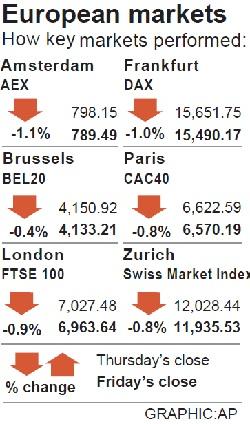European stocks fell on Friday, capping their third straight week in the red, as the basic resources sector was hit by declines in Anglo American PLC, but news that the UK was mulling easing travel restrictions boosted airlines and hotel groups.
Anglo American tumbled 8.1 percent after Morgan Stanley and UBS Group AG downgraded the stock.
The European mining index was also hit by worries about slowing growth in China, falling nearly 8 percent for the week.

The pan-European STOXX 600 fell 0.9 percent on the day, but fell 1 percent for the week.
London’s miner-heavy FTSE 100 index shed 0.9 percent, while German stocks fell 1 percent.
Most regional indices were pressured this week on worries about slowing global growth and tighter regulation of Chinese firms.
“Although still fairly measured at present, this current sell-off has the potential to be one of the most dramatic pullbacks we have seen all year, as inflation, stagflation, slowdown and virus risks all combine to knock back European and US markets,” IG chief market analyst Chris Beauchamp said.
Meanwhile, after closing up 3.4 percent on Thursday in one of the best single-day performances this year, the European travel and leisure index added 1.2 percent on Friday. The index closed 2.7 percent higher for the week, leading gains across European sectors.
Wizz Air Holdings PLC, British Airways owner IAG and InterContinental Hotels Group PLC rose 2 to 5 percent after the UK said it would simplify COVID-19 rules for international travel.
While European stock markets ended the week on a steady footing, next week could be pivotal in determining near-term market direction, with the US Federal Reserve and the Bank of England’s policy meetings, as well as German elections on deck.
“If the caution we have seen this week does carry over into Monday and beyond, then the next Fed meeting provides another reason to tread carefully,” Beauchamp said.
China-exposed luxury stocks such as LVMH Moet Hennessy Louis Vuitton SE, Kering SA, Hermes International SCA and Richemont SA rebounded, following sharp losses earlier this week on fears of fresh COVID-19 restrictions and regulatory moves in China.
Germany’s Commerzbank AG climbed 1.2 percent after a Handelsblatt report said US investor Cerberus Capital Management was considering taking a 15.6 percent state in the bank after the federal election.
Spanish pharmaceuticals company Grifols SA rose 5.8 percent after it proposed a 1.6 billion euro (US$1.9 billion) takeover of its German rival Biotest AG in a move to consolidate the plasma-based drug industry.

In Italy’s storied gold-making hubs, jewelers are reworking their designs to trim gold content as they race to blunt the effect of record prices and appeal to shoppers watching their budgets. Gold prices hit a record high on Thursday, surging near US$5,600 an ounce, more than double a year ago as geopolitical concerns and jitters over trade pushed investors toward the safe-haven asset. The rally is putting undue pressure on small artisans as they face mounting demands from customers, including international brands, to produce cheaper items, from signature pieces to wedding rings, according to interviews with four independent jewelers in Italy’s main

Japanese Prime Minister Sanae Takaichi has talked up the benefits of a weaker yen in a campaign speech, adopting a tone at odds with her finance ministry, which has refused to rule out any options to counter excessive foreign exchange volatility. Takaichi later softened her stance, saying she did not have a preference for the yen’s direction. “People say the weak yen is bad right now, but for export industries, it’s a major opportunity,” Takaichi said on Saturday at a rally for Liberal Democratic Party candidate Daishiro Yamagiwa in Kanagawa Prefecture ahead of a snap election on Sunday. “Whether it’s selling food or

CONCERNS: Tech companies investing in AI businesses that purchase their products have raised questions among investors that they are artificially propping up demand Nvidia Corp chief executive officer Jensen Huang (黃仁勳) on Saturday said that the company would be participating in OpenAI’s latest funding round, describing it as potentially “the largest investment we’ve ever made.” “We will invest a great deal of money,” Huang told reporters while visiting Taipei. “I believe in OpenAI. The work that they do is incredible. They’re one of the most consequential companies of our time.” Huang did not say exactly how much Nvidia might contribute, but described the investment as “huge.” “Let Sam announce how much he’s going to raise — it’s for him to decide,” Huang said, referring to OpenAI

The global server market is expected to grow 12.8 percent annually this year, with artificial intelligence (AI) servers projected to account for 16.5 percent, driven by continued investment in AI infrastructure by major cloud service providers (CSPs), market researcher TrendForce Corp (集邦科技) said yesterday. Global AI server shipments this year are expected to increase 28 percent year-on-year to more than 2.7 million units, driven by sustained demand from CSPs and government sovereign cloud projects, TrendForce analyst Frank Kung (龔明德) told the Taipei Times. Demand for GPU-based AI servers, including Nvidia Corp’s GB and Vera Rubin rack systems, is expected to remain high,